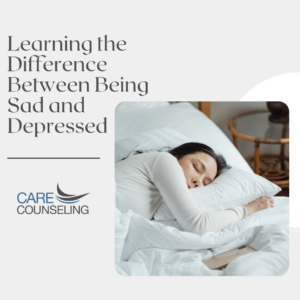Understanding the Difference Between Sadness and Depression
 Emotions are an integral part of the human experience, and we all encounter moments of sadness and distress. It’s normal to feel down from time to time, but it’s also essential to differentiate between these natural emotional responses and more serious conditions like depression. Let’s explore the distinction between sadness and depression, helping you gain a better understanding of these complex emotions.
Emotions are an integral part of the human experience, and we all encounter moments of sadness and distress. It’s normal to feel down from time to time, but it’s also essential to differentiate between these natural emotional responses and more serious conditions like depression. Let’s explore the distinction between sadness and depression, helping you gain a better understanding of these complex emotions.
Sadness: A Natural Human Emotion
Sadness is a universal human emotion that everyone experiences at some point in their lives. It is often triggered by specific events or circumstances, such as the loss of a loved one, a breakup, or a disappointing experience. Sadness tends to be time-limited and can vary in intensity and duration.
Key Characteristics of Sadness
- Triggers: Sadness usually has identifiable causes, such as a particular event or situation.
- Temporary: Sadness tends to be a temporary emotion that typically diminishes as time passes.
- Proportional: Sadness is often a proportionate emotional response to a particular event or loss.
- Maintains Self-Esteem: People experiencing sadness usually maintain their self-esteem and a sense of self-worth.
- Normal Functioning: Individuals feeling sad can often continue with their daily activities and responsibilities.
Depression: A Complex Mental Health Condition
Depression, on the other hand, is a complex mental health condition that goes beyond the occasional experience of sadness. It is characterized by a persistent and pervasive low mood that can significantly impact one’s daily life and functioning. Depression is not always tied to a specific event or trigger and may not have an apparent cause.
Key Characteristics of Depression
- Long-Lasting: Depression persists for an extended period, typically lasting for weeks, months, or even years if left untreated.
- Chronic: It is often a recurring condition, with multiple episodes of depression throughout a person’s life.
- Disproportionate: The severity of depressive symptoms may not always be directly related to external circumstances.
- Self-Esteem: Depression often leads to negative self-perceptions, low self-esteem, and feelings of worthlessness.
- Impaired Functioning: Individuals with depression may struggle to carry out their daily responsibilities and may experience difficulties in relationships, work, and other areas of life.
Recognizing the Differences
While sadness and depression share some common emotional components, certain distinctions can help you recognize when someone may be experiencing more than just temporary sadness:
- Duration: If the low mood persists for an extended period, well beyond what you would expect for a typical emotional response, it may indicate depression.
- Severity: The intensity of the emotional distress is another crucial factor. If the person’s sadness is overwhelming and unrelenting, it may suggest depression.
- Lack of Triggers: Depression may not always have an obvious external cause, whereas sadness is often linked to specific events or situations.
- Impact on Functioning: Consider how the person’s emotional state affects their daily life. If it impairs their ability to carry out routine tasks or maintain relationships, it could be a sign of depression.
- Physical Symptoms: Depression often comes with physical symptoms such as changes in appetite, sleep disturbances, and fatigue.
The Importance of Seeking Help
If you suspect that someone may be struggling with depression rather than temporary sadness, it’s essential to encourage them to seek professional help. Depression is a treatable condition, and early intervention can lead to better outcomes.
Offering Support
Whether someone is experiencing sadness or depression, offering support and understanding is invaluable. Here are some ways to be there for someone who may be struggling:
- Listen Non-Judgmentally: Create a safe space for them to express their feelings without fear of judgment.
- Encourage Communication: Let them know that you are there to talk and that their feelings are valid.
- Offer Help: Help them find resources, such as therapists, support groups, or crisis hotlines, if needed.
- Stay Connected: Continue to reach out and check in on them regularly, especially if they are experiencing depression.
Recognizing the difference between sadness and depression is a crucial step in providing appropriate support to yourself or someone you care about. While sadness is a natural human emotion that typically subsides with time, depression is a complex mental health condition that may require professional treatment. By understanding these distinctions, we can foster empathy and encourage those in need to seek the help and support they deserve.



























